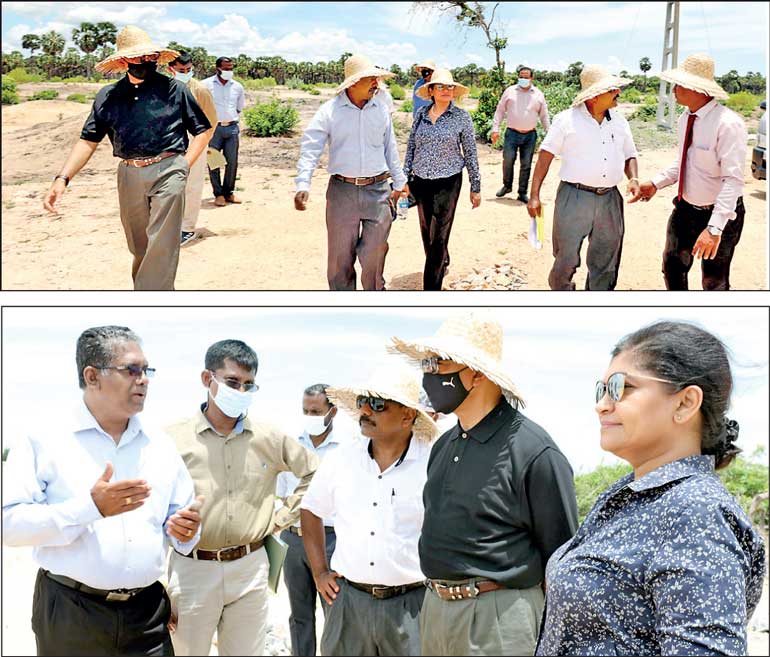Saturday Feb 21, 2026
Saturday Feb 21, 2026
Monday, 2 May 2022 00:00 - - {{hitsCtrl.values.hits}}


The Board of Investment (BOI) said yesterday that the Fabric Park in Punnakuda, Batticaloa will strengthen import substitutes for the apparel industry and save $ 500 million annually.
BOI Chairman Raja Edirisuriya said that the initiative is the largest development project in Eastern Province with an investment worth Rs. 5.5 billion on infrastructure facilities and other development purposes. Four leading garment manufacturing companies have expressed willingness to invest.
BOI said Sri Lanka annually spends $ 6 billion on raw materials needed for textile manufacturing and with this Textile Park, raw materials worth $ 500 can be manufactured, and at least 5,000 job opportunities would be created.
The Park has been designed using the latest technology and in an environmentally friendly manner.
BOI said Sri Lanka is a county that has garnered immense acclaim and a strong reputation worldwide for manufacturing high-quality apparel trusted by the iconic global fashion brands. Sri Lanka annually imports textile raw materials used in the apparel industry worth $ 6 billion from different countries around the globe.
Taking this into account, the attention of the BOI was drawn to set up the Textile Park in Punnakuda, Batticaloa with the intention of manufacturing textile raw materials.
The Park, which is a 255-acre land, is equipped with all facilities and the potential to establish eight to 10 large-scale factory complexes. Furthermore, the Textile Park can be named the largest development project being undertaken in the Eastern Province.
In addition, the Government is to spend Rs. 5.5 billion on the development of infrastructure facilities in the project which will eventually boost infrastructure facilities in the area.
BOI Chairman Raja Edirisuriya and its Director General Renuka M. Weerakone made an inspection tour alongside a group of investors who are geared to embark on new projects in the Fabric Park.
BOI Chairman Edirisuriya further expressed positive sentiments and said: “We are pleased to launch the first phase of the park, which will provide an opportunity to add raw materials to the local apparel industry. Accordingly, this will not only prevent the $ 500 million from flowing out of the country but also provide an opportunity to manufacture apparel made entirely from local materials for the global market.”
“Moreover, expectations are that it will show the results of the economic and social growth that can be seen in investment zones under the BOI such as Katunayake, Biyagama, Koggala and Seethawaka,” the Chairman emphasised.
BOI Director General Renuka M. Weerakone said: “The Textile Park has been constructed following a thorough and extensive study done by BOI officials where they have recommended that it be converted into an investment zone.
“The BOI has also taken initiative in obtaining necessary approvals from relevant line ministries and institutions. We as the BOI aspire to establish the Textile Park in a more environmentally friendly manner,” she stressed.
BOI Executive Director (Zones) M.K.D. Lawrance expressing positive sentiments said: “The steps have been taken to provide facilities needed to set up factories in parallel to developing infrastructure facilities in the region. The construction works of 40% of access roads have been completed and a daily water capacity of 1500 - 2000 cubic metres has been supplied to fulfil the water requirements of setting up factories. Electricity has also been supplied while the basic constructions of the wastewater treatment plant have also been completed.”
The investors who joined the inspection tour opined that Sri Lanka has been outstanding in the global apparel industry for over 50 years. However, Sri Lanka has to import all textile raw materials, except a few, from foreign countries. “We have to come across various hurdles in importing these raw materials given the current global competition because all the nations that manufacture raw materials are also engaged in the production of garments,” they pointed out.
“Thus, a much-needed fabric Park will tremendously help Sri Lanka to save money and develop sustainable import substitutes for the apparel industry in the country. Besides, setting up a fabric park of this nature will help Sri Lanka procure raw materials on time and complete the orders on time,” the group of investors added.